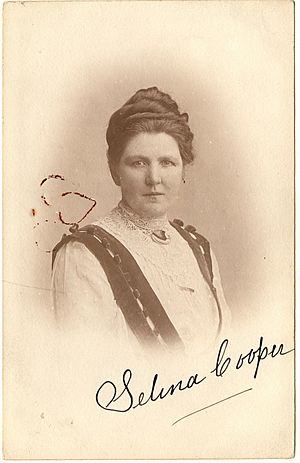Selina Cooper facts for kids
Selina Jane Cooper (born Coombe; 4 December 1864 – 11 November 1946) was an important English woman. She fought for women's rights, especially the right to vote. People who did this were called suffragists. Selina Cooper was also the first woman to represent the Independent Labour Party (ILP) in 1901. She was chosen as a Poor Law Guardian, which meant she helped people who were poor or in need.
Contents
Selina Cooper's Early Life
Selina Cooper was born Selina Coombe in Callington, Cornwall in 1864. She was one of seven children. Her father worked on the railway. In 1876, when Selina was 12, her father died. After this, her family moved to Barnoldswick.
At just 12 years old, Selina started working in the local textile mills in Barnoldswick. She left school when she was thirteen. From then on, she worked full-time in the mills.
Fighting for Workers' Rights
Selina Cooper became very active in helping workers. She joined groups that worked to make jobs better. These groups are called trade unions. She also took classes in things like laundry, hygiene, and first aid. In 1895, she joined the Barnoldswick St John's Ambulance Committee.
She was an early member of the Nelson Social Democratic Federation (SDF). This was a political group that wanted to help working people. Later, she started her own branch of the SDF in Brierfield. In 1897, she joined the Women's Co-operative Guild. This group helped women and families. In 1900, she joined the North of England Society for Women's Suffrage. This group worked for women's right to vote.
Leading the Suffrage Movement
In 1901, Selina Cooper was chosen to join the Board of Guardians. She was supported by both the SDF and the ILP. She became frustrated because the SDF wasn't focusing enough on women's right to vote. So, she left the party. She then became a full-time organizer for the suffrage movement. This meant she worked hard to get women the right to vote.
In 1910, Selina was one of four women chosen for a very important task. They met with H. H. Asquith, who was the Prime Minister at the time. They presented the case for why women should be allowed to vote. Selina, along with Ada Nield Chew and Margaret Aldersley, were well-known activists in Lancashire.
During the First World War, Selina Cooper helped create the first Maternity Centre in Nelson, Lancashire. This was a special place for pregnant women and new mothers. Later, she was elected to the town council. She also became a local magistrate, which meant she helped make decisions in local courts. In the 1930s, she left the Labour Party. She felt the party was not strong enough against fascism, a type of strict government.
Remembering Selina Cooper
Selina Cooper's old house at 59 St Mary's Street in Nelson has a special blue sign. This sign is called a heritage blue plaque. It shows that an important person lived there. In 2015, a play was made about her life. It was called "Hard-Faced Woman" and was performed by the Function Factory theatre in Nelson.
 | James Van Der Zee |
 | Alma Thomas |
 | Ellis Wilson |
 | Margaret Taylor-Burroughs |


